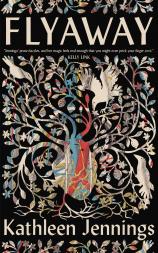Flyaway
Review
Flyaway
I had an Australian friend in high school. Her parents were journalists posted to New York, and I spent a summer with her family in a rental house on Long Island. I got to know the accent well, along with the warm, informal, slightly raffish culture. But I don't recall being exposed to a new vocabulary.
Which is why, when I began to read FLYAWAY, Kathleen Jennings’ slim new fantasy/gothic novel, I was startled to find that I had to look up the meaning of a number of words (for example, SUVs are known as utes; Noisy Miners are a kind of bird; brigalow is a tree) --- something I haven’t done since studying for the SATs two centuries ago.
This is not the clichéd tourist Australia of kangaroos and koala bears. The setting is the rough-and-ready outback culture and (to me) exotic flora and fauna of western Queensland, where the author grew up. Jennings is as much artist as writer. The cover of FLYAWAY is ravishing, like an illuminated manuscript, and her passion for images is evident in her lush descriptions of the wild and beautiful country beyond the towns.
"Jennings’ setting is her strength, her source of literary power.... Maybe you won’t be booking a flight to Sydney or Perth anytime soon, but pick up this enthralling book, and you can still fly away to Australia."
Nineteen-year-old Bettina Scott is a town girl through and through when we first encounter her. But we soon learn that she wasn’t always “responsible and civilised and winsome,” but took after her “mocking father and unloving brothers.” Now the men in the family are gone. Her father vanished mysteriously three years ago, and her brothers left soon after. Bettina is entirely in the pale, ladylike hands of her mother, Nerida, who has set out to expunge any rowdiness or rebellion.
Already, though, there are hints of a murky past resurfacing: the word MONSTERS written on the Scotts’ fence, a hand-delivered note that accuses Bettina of cowardice and calls her “Tink,” a nickname used only by her father and brothers. What really happened the night her father disappeared? Bettina’s memories are confused. So, with the help of Gary Damson and Trish Aberdeen --- both childhood friends from whom she’d become estranged, both somehow implicated in the events of that half-remembered night --- she sets off into the “howling wilderness,” as her mother once called it, to trace the source of the note and (just maybe) find her true identity.
In this sense, FLYAWAY is a coming-of-age story, complete with an ill-assorted, bickering teenage crew. Gary, who’s driving, has red hair and a noisy, untidy red truck. Trish, who’s been away at university, shows up in short shorts and boots and has a wolf tattoo on her shoulder. Bettina, in contrast, wears a demure pastel cardigan and dress and brings a picnic basket with sandwiches. Inside, though, she’s churning, the pull homeward to her mother counterbalanced by a sudden desire “to take my life into my own hands.”
This novel, however, is no conventional quest narrative. The account of the journey is interspersed with a series of fantastic tales about the kids’ forebears that feature everything from murderous plants to shape-changing creatures to bottles of glittering magical dust. Metamorphosis is a major theme. Boundaries, especially those between human beings and the natural world, are elusive: a woman turns into a shadowy beast, two boys into birds. Disappearances are frequent: Bettina’s father and brothers, Trish’s mother, Gary’s uncle. But, as the aptly named wise woman, Gwenda Sage, proclaims, “Who ever really disappears?… Things change, but that’s not the same as leaving.”
The tales become darker and more menacing the deeper the protagonists go into the bush. In the end, the supernatural merges with the mundane as the trio arrives at a derelict farm, apparently deserted, where Bettina and her parents and brothers lived before they moved to town. There she makes shocking discoveries about the fate of the men in the family. Violent confrontations follow. No longer neat and pretty but bruised and bloody, Bettina is finally able to grasp her parents’ true nature.
There’s a mythic cast to these last scenes, a familial savagery worthy of characters like Medea and Electra. But I’m not sure it quite meshes with the youthful angst of Bettina, Trish and Gary. Jennings is more into fantasy and folklore than psychology, which means the characters tend to be embodiments of ideas or family traits rather than individuals with genuine emotional depth.
In FLYAWAY, Jennings’ setting is her strength, her source of literary power. Although her novel is informed by the classic European, Scandinavian and English tales she grew up with --- in an interview she cites “Beauty and the Beast,” among others, and one of the stories is definitely based on “The Pied Piper” --- its inspiration is the distinctive history and landscape of her own country.
Maybe you won’t be booking a flight to Sydney or Perth anytime soon, but pick up this enthralling book, and you can still fly away to Australia.
Reviewed by Katherine B. Weissman on July 31, 2020




